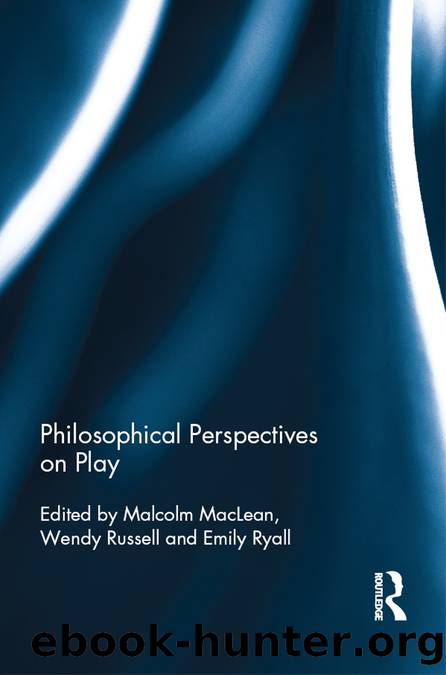Philosophical Perspectives on Play by Unknown

Author:Unknown
Language: eng
Format: epub
ISBN: 3570390
Publisher: Routledge
Their delight was in dancing
After the sack of Troy, Odysseus eventually washed ashore in Phaiacia and was tended by the princess of that land, Nausicaa. The king, Alcinoos, invited this stranger (who was not known to be the famous Odysseus) to some sport events so as to convince the stranger of the Phaiacians’ prowess. After the Phaiacians had participated in a footrace, wrestling, the long jump, the discus and boxing, attention shifted to the stranger so as to determine if he had any ability. The fact that the stranger had endured hardships at sea led some of the Phaiacians to be sceptical, despite the fact that Athena had graced Odysseus with some additional size and strength for the occasion.
Here Odysseus faced a dilemma. On the one hand, the common assumption among the thousands who were assembled seemed to be that there was no greater glory for the living than that found in sport victory. On the other hand, Odysseus was weighed down with matters that were more serious than mere games in that his ship was being prepared for his renewed quest to make it home to Ithaca.
Odysseus submitted to the test because his initial reluctance to participate gave the (mistaken) impression that he was not interested in sport. Indeed, he wished to respond to the taunt that suggested that he had no sport ability. Specifically, he picked up a discus and hurled it far beyond the distance covered by the previous discus throwers. This feat was even more impressive given the fact that his discus was heavier than those used previously. In the ancient discus event, the weight would get progressively heavier with each throw, but Odysseus went immediately to the heaviest discus.
His success with the discus led him to challenge anyone present to a contest in other events: boxing, wrestling, running or archery (his boast regarding this last event presaged the deadly archery contest at the end of the Odyssey). His only fear concerned the footrace because his adventures at sea had debilitated his legs; but his upper body strength remained intact and hence gave him confidence regarding his ability to box and wrestle and shoot arrows.
There was no occasion, however, for Odysseus to prove himself in any events in addition to the discus due to the friendly intervention of Alcinoos. Herein lies the nonseriousness of the sport events of the Phaiacians. Despite the fact that the infinitive athleuein (to compete for a prize) and its cognates are used frequently in Book 8 of the Odyssey, no prizes were awarded for victory. The gifts that Odysseus received were rather due to the fact that he was a stranger of noble (perhaps even divine) birth and the Phaiacians wanted to show hospitality to such a guest. That is, they were more serious about hospitality than they were about sport.
Whereas previously it was hyperbolically asserted that the Phaiacians were the best competitors in the world, Alcinoos makes it clear that this boast cannot be redeemed. In fact, they were not at all very good at boxing and wrestling.
Download
This site does not store any files on its server. We only index and link to content provided by other sites. Please contact the content providers to delete copyright contents if any and email us, we'll remove relevant links or contents immediately.
The Rules Do Not Apply by Ariel Levy(4936)
Bluets by Maggie Nelson(4534)
Too Much and Not the Mood by Durga Chew-Bose(4319)
Pre-Suasion: A Revolutionary Way to Influence and Persuade by Robert Cialdini(4195)
The Motorcycle Diaries by Ernesto Che Guevara(4069)
Walking by Henry David Thoreau(3939)
Schaum's Quick Guide to Writing Great Short Stories by Margaret Lucke(3361)
What If This Were Enough? by Heather Havrilesky(3297)
The Daily Stoic by Holiday Ryan & Hanselman Stephen(3287)
The Day I Stopped Drinking Milk by Sudha Murty(3180)
The Social Psychology of Inequality by Unknown(3008)
Why I Write by George Orwell(2933)
Letters From a Stoic by Seneca(2774)
A Short History of Nearly Everything by Bryson Bill(2675)
A Burst of Light by Audre Lorde(2582)
Insomniac City by Bill Hayes(2533)
Feel Free by Zadie Smith(2466)
Upstream by Mary Oliver(2377)
Miami by Joan Didion(2354)
